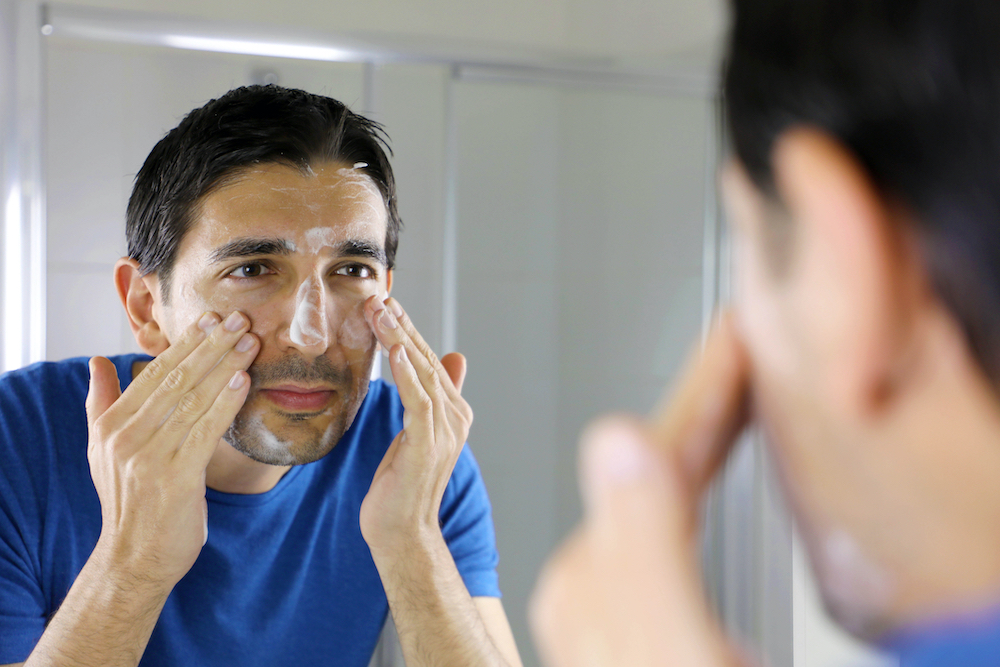Are You Washing Your Face the Wrong Way?

You probably think that cleansing your face is pretty simple. Soap, water, washcloth and you’re all set! The reality is that many people are washing their faces the wrong way, contributing to breakouts and other complexion issues. You should have a daily skincare routine that starts with proper washing practices. If you have a good routine that you stick to, you will see big changes in your skin for the better.
Are you making these common face washing mistakes?
Everyone’s skin is different. What works for your mother, sister or best friend will not necessarily work for you. The complexion of your skin depends on a number of factors, both genetic and environmental. Where you live, your water intake and the products you use all contribute to the health and look of your skin. These internal and external factors will dictate the best way to approach how you should wash your face.
As a dermatologist, I see many patients struggling with acne or other complexion concerns. While there are many possible causes, I always want to start with how they are cleansing their skin. Over the years, I have noticed some common mistakes that many people make, including:
- Using the wrong cleanser.
- Choosing the wrong temperature of water.
- Washing only once per day.
- Neglecting to exfoliate.
Let’s dive a little deeper into these common face washing mistakes. By avoiding these cleansing errors, you can be sure that your skin is ready for the skincare products and treatments that will help you achieve the skin of your dreams.
Using the wrong cleanser.
We all have a skin type that tells us how to best cleanse, treat and moisturize. By understanding your skin type, you will know if your skin is oily, dry, acne prone, sensitive or combination. With this knowledge, you can choose the right product for you.
Sometimes, people mistakenly choose a harsh cleanser thinking that it will provide a deep clean. Other times, patients choose a product that is too gentle to remove heavy makeup or oils. The key is to find a balance that works for your skin type.
Cleansers that contain fragrances, preservatives and other chemicals can be too harsh for your facial skin and cause irritation. Look for hypoallergenic ingredients that are less likely to cause irritation or exacerbate acne or rosacea.
Learn more about skin types here.
Choosing water that is too hot (or too cold).
Hot water is more effective at removing dirt and oils. However, it can also strip your skin of its necessary oils and damage your skin with consistent use. Cold water may not remove all of the makeup or other products on the face. The best choice is to choose warm water.
How do you know if your water is the right temperature? If your skin is tight after cleansing, you may be using water that is too hot. If your skin is red and irritated, it might be another sign that your water is too hot. On the other hand, if your skin does not feel clean or you can see remnants of dirt or makeup, your water might be too cold.
Washing only once per day.
While you don’t want to over cleanse your skin, you should wash or rinse your skin at least twice a day to remove dirt, oil and products that have accumulated over the course of the day. For some patients, a simple warm water rinse will be enough to remove oils and dirt. For others, they may opt for a skin-appropriate cleanser twice a day.
Although convenient, it is not recommended to use cleansing wipes. Wipes can leave a residue and often include ingredients that can irritate your skin. If you do choose to use wipes, be sure to check the ingredients and avoid those with heavy fragrances or preservatives.
Neglecting to exfoliate.
Exfoliation is critical to healthy, bright skin. But, it has gotten a bad name over the years because many people exfoliated too much, resulting in irritation and breakouts. Proper exfoliation removes dead skin cells that have built up and other residue that makes your skin look dull. It also allows your products to absorb more fully, making them much more effective.
Gentle exfoliation is key – harsh exfoliation will have the opposite effect that you want. If you have sensitive skin, consult with your dermatologist to determine the best way to exfoliate.
